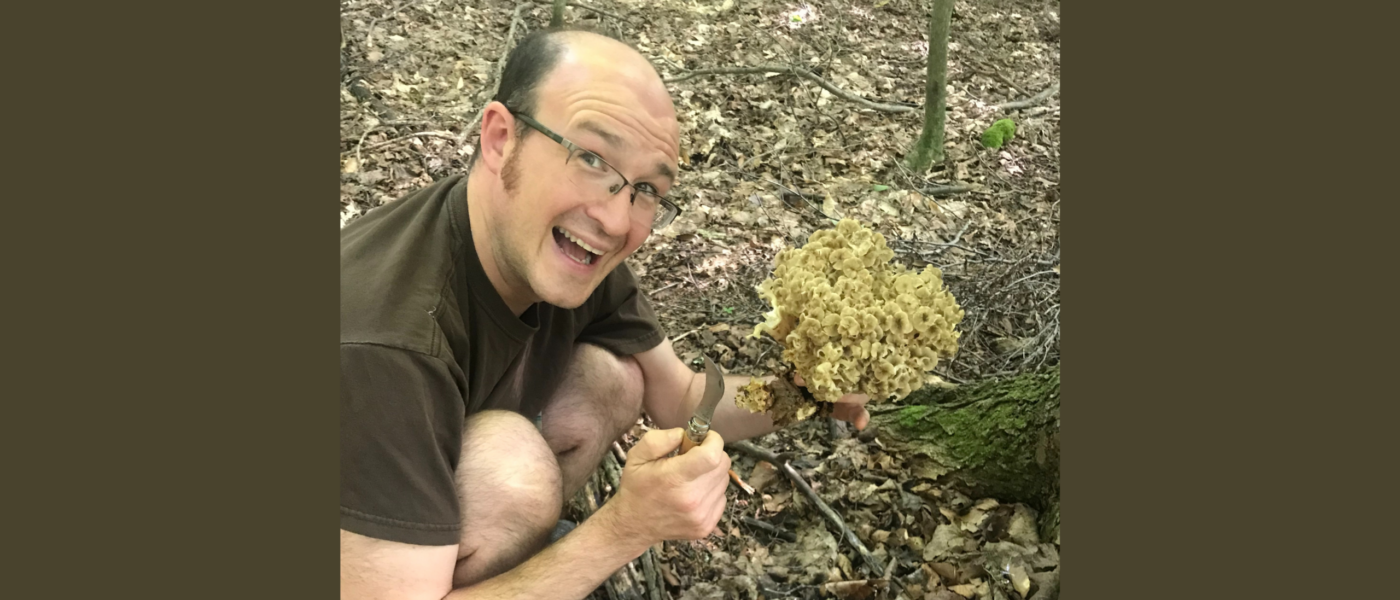Below is a Q+A with Collar City Mushroom’s Avery Stempel, who is not only our Farmer Hero, but also will lead a mushroom-growing demonstration in the Farm Aid 2024 HOMEGROWN Skills Tent. If you’ll be joining us in Saratoga Springs, NY, this coming September, be sure to come watch his presentation.
Jessica: We’re all curious to learn about Collar City Mushrooms. Can you tell us about your mushroom operation?
Avery: Collar City Mushrooms is an indoor urban vertical mushroom farm, mycological education center and community gathering space in Troy, New York. We grow about 200 pounds of mushrooms every week that mostly gets delivered to local restaurants and independent grocery stores. Our farm shop and occasional pop-up market opportunities provide direct to consumer sales of not only our fresh fungi, but also value added products like salts, teas, jerky and supplements that we produce. We host field trips for learners of all ages, offer workshops, poetry performances, art shows, music events and skill building activities from grow-your-own mushrooms to knitting. We also push into classrooms, libraries and garden club meetings to spread mycelial knowledge.
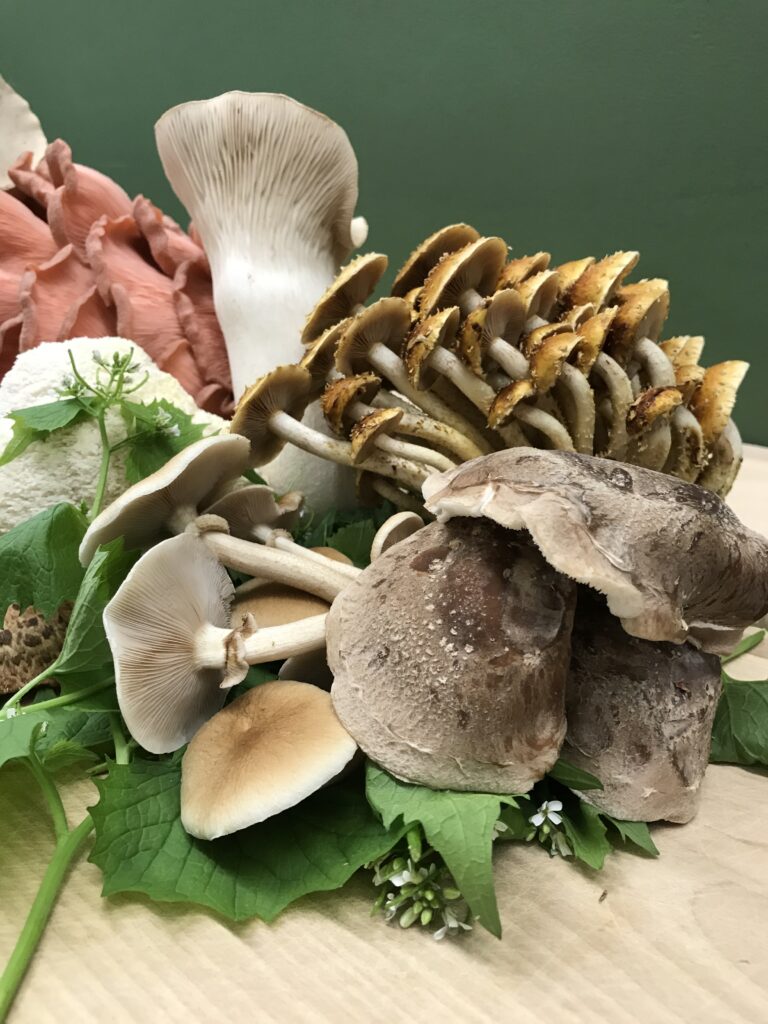
Jessica: Mycelial knowledge! That’s great! How did you get into growing mushrooms?
Avery: Mushrooms have been a lifelong passion for me. I grew up on a sawmill and my father was a lumberjack. When he would cut old hardwoods down he would bring giant bracket mushrooms back to decorate our home. We used split wood for heat. The pieces of wood we burned would often have tiny mushrooms or at least mycelium growing through them. I was fascinated by the forest as a young one – always exploring the splashes of color that were mushrooms poking from the loamy soil or pushing out of trees.
As I explored, I got into identifying mushrooms and then eventually foraging. When I met my partner Amy, one of the things that drew us together was our love of all things fungi. She had been growing shiitake in logs as a hobby and we expanded into oyster mushrooms as well. Having a mushroom farm was a dream we shared.
When the COVID pandemic struck, I was managing the front of house of a performing arts center and was furloughed. I took it as an opportunity to pivot, cashed in my retirement, raised some family and friend capital and started Collar City Mushrooms.
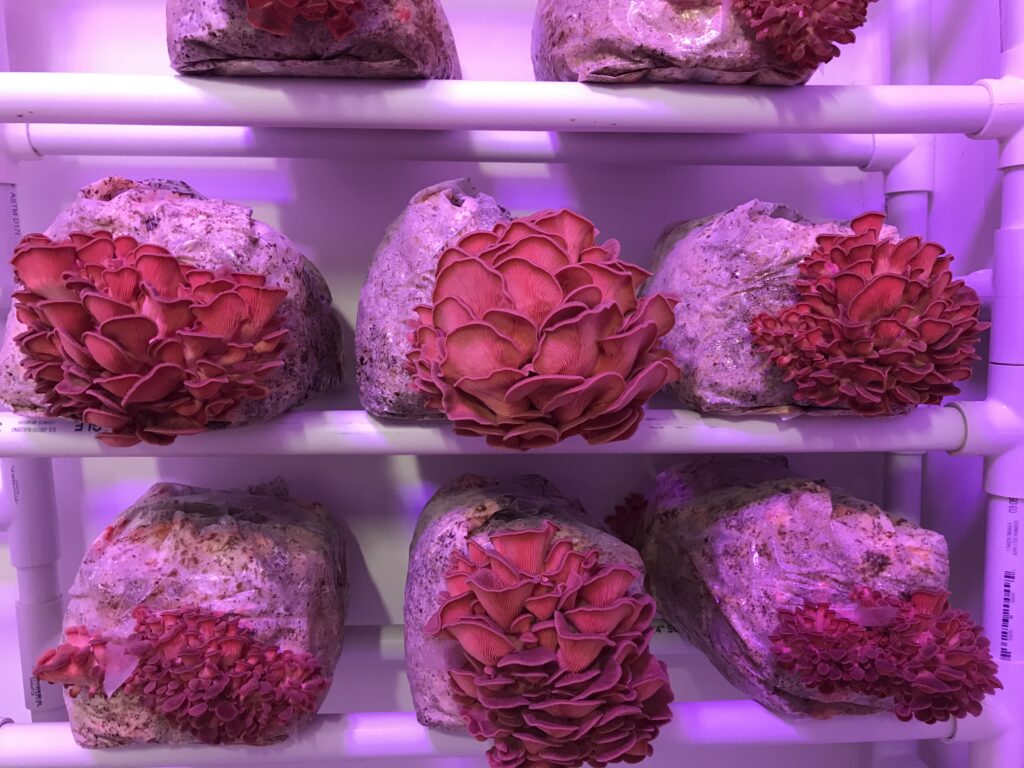
Jessica: You got into this a little, but can you explain further why mushrooms?
Avery: The funga kingdom is so fascinating, with so many uses beyond food. A leather like textile can be made from its mycelium. Certain mushrooms can be used to clean up environmental disasters. NASA is working on using radiotrophic fungi to protect astronauts in space.
They help plant life flourish. A mushroom is not only the largest, but also the oldest organism that humans have discovered. The caverns one can explore when delving into the heart of fungi are deep and convoluted. Truly incredible organisms.
As a food source, they are unparalleled. Hugely sustainable, requiring very few resources to produce; most waste products are converted into compost; they are protein rich, nutrient dense, immuno-modulating superfoods that grow rapidly when exposed to appropriate conditions through controlled environment agriculture. They can easily be seasoned to blend into any cuisine style and there are so many varieties to choose from. We host dinners at our farm curated by visiting chefs who incorporate mushrooms into every course from appetizers to desserts. They can be a side dish, or the featured item. They are one of the most versatile ingredients.
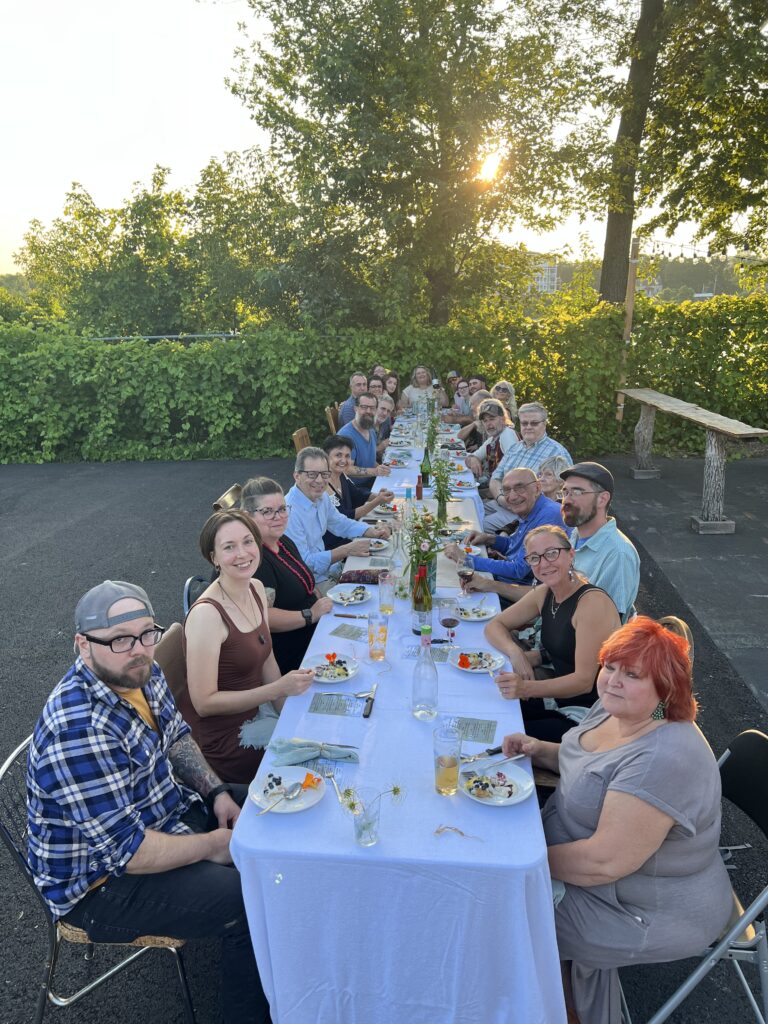
Jessica: Your website mentions foraging. Do you also sell foraged mushrooms?
Avery: We do sell wild-harvested mushrooms and greens in season. People who have been curious about foraged foods, but not had the time, ability or confidence to get in the forest on their own have been able to try some of these unique delicacies. We have even run a multi-city foraged food festival for three years running now with some amazing local partners. Nadine Medina is the creator of this incredible event and with forager musician Sean Rowe we have brought locally wild harvested goods, entertainment and education to the region through participating restaurants, preserves and community spaces. We also lead fungi forays for identification purposes and we walk people’s land identifying mushrooms we may find.
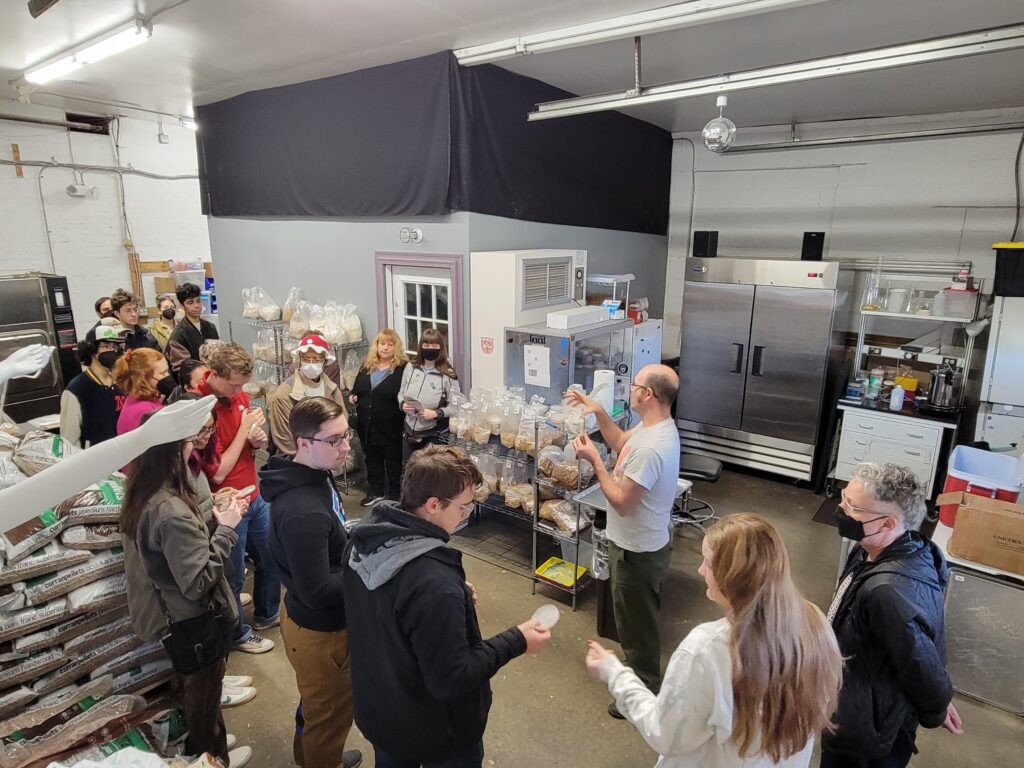
Jessica: Farming isn’t easy: What keeps you going and gets you up in the morning?
Avery: Farming surely is a grueling occupation. Long hours and constant hands-on action fill every single day. The beauty of the fruiting fungi themselves is one thing that keeps me going. Each individual mushroom is unique and awe inspiring. Customer appreciation and excitement is also a wonderful perk. Guests come into our store with such wonder, it is delightful to entertain them with fungal factoids. Educating budding mycologists of all ages is also critically important to me. The mycelial realm is often mysterious and misunderstood. It is encouraging to see that more and more people are interested in learning about our fungal cousins. The partnerships we have with our restaurant chefs is also an absolute boon. Getting to try the culinary creations that everyone produces has been one of my favorite perks!
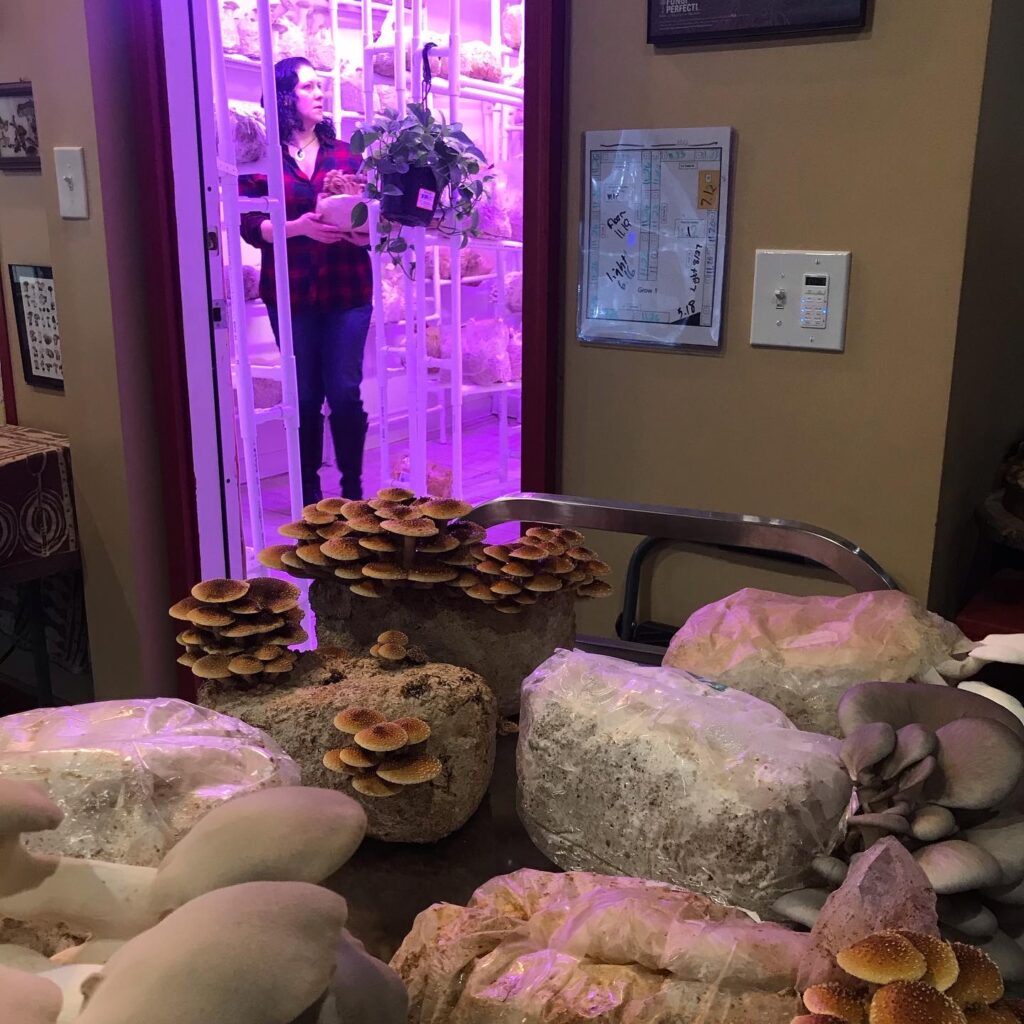
Jessica: What’s your favorite type of mushroom to eat? What about your favorite variety to grow?
Avery: My favorite type of mushroom to eat is usually the one on my plate at that moment! Mushrooms come in so many varieties of texture, taste and nutritional content, that it is very difficult to point to just one and claim it as a favorite.
I have certainly had some memorable mushroom moments though. Finding an umbrella polypore in the forest and cooking it for the first time was extremely mind blowing. It came on with subtle fruity notes similar to an apricotish like flavor and finished with a strong anise taste, like sausage. I haven’t had another straight-from-the-ground culinary sensation quite like it!
Cultivating mushrooms is also such a joy. They all grow so uniquely. Pink oysters curl and ripple and are so vibrantly pink. Nameko with their viscous outer coating. Lions with their fluffy white toothiness. Every single mushroom expresses itself in stunning ways so that walking through the grow rooms is like visiting an ever changing organic art gallery.
Jessica: Lastly, is there anything else you’d like to tell us about your operation?
Avery: We opened as a culinary mushroom farm, but one of the most frequent requests we would get when customers would stop in is if we had “those” mushrooms, meaning active psilocybin-containing mushrooms. It happened with such regularity that we decided to take action. One of our frequent customers happened to be a radio producer at a small independent station in Troy, NY, and we put together a state-wide symposium called “Ending the Prohibition of the Mind.” Out of that two-hour long discussion with lawmakers, lawyers, therapists and advocates, our movement to legalize psilocybin-containing mushrooms was born. We formed a group called “New Yorkers for Mental Health Alternatives,” hold monthly educational meetings, have met with dozens of state lawmakers and have drafted a bill that was proposed by New York Assemblymember Amy Paulin (D- Chair of the NYS Assembly Health Committee). We have also become active in the New York State Farm Bureau and are advocating for urban farmer needs and specialty crop specific support.
Jessica: Thank you, Avery! We look forward to having you at Farm Aid 2024!
